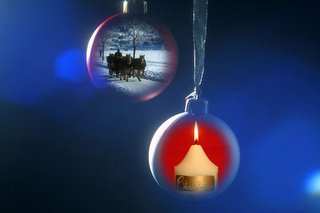 Some common sense from the Great White North. Here in Los Angeles, it's 85F at 2:30 PM on Christmas Eve, which is unusual even for LA. Sorry if your freezing where you are. Merry Christmas!
Some common sense from the Great White North. Here in Los Angeles, it's 85F at 2:30 PM on Christmas Eve, which is unusual even for LA. Sorry if your freezing where you are. Merry Christmas!EDITORIAL: Defending Christmas
Tomorrow, of course, is Christmas Day. But were it not for a decision of the early Christian church, tomorrow might be just another Sunday in December. And Christmas might not be until January 2.
Or even April 18 or 19.
How about celebrating Christmas on May 20? Well, if nothing else, the weather
would probably be a bit warmer.
We ran across that little tidbit of information in the Evangelical Dictionary of Theology’s entry about Christmas.
But how December 25 got picked as Christmas Day is still the subject of some controversy. The Bible is utterly silent as to the exact date of the birth of Jesus Christ, but within a few centuries of his ministry on Earth, churches were holding celebrations of his birthday – although they couldn’t agree on a common date.
According to the aforementioned tome, Dec. 25 became recognized as the official date as the “church ... offered the people a Christian alternative to the pagan festivities” celebrating Saturnalia and the winter solstice at that time of year.
But the Dictionary of Christianity in America also suggests the Dec. 25 date may reflect the early church believing Christ was crucified on March 25, with his birthdate then being marked nine months after that. (That said, this resource book also admits that the “coincidence with the traditional winter solstice surely influenced the popularity of Christmas.”)
And, according to Brian Moynahan’s book The Faith: A History of Christianity, the first recorded observance of Christmas Day is found in a Roman calendar dated 336.
The Evangelical Dictionary of Theology notes that as Christianity spread to Europe, many of the symbols used in the pagan winter festivals, such as holly, mistletoe and even the Christmas tree itself, were appropriated by the Christian church and incorporated into its Christmas celebrations.
Not surprisingly, perhaps, the usage of non-Christian symbols into Christianity’s second-most holy day (right after Easter) has not sat well with some parts of the Christian church over the years. The Dictionary of Christianity in America even notes that the celebration of Christmas was outlawed in 1659 in Massachusetts because of the usage of pagan imagery. (The law was repealed in 1681.)
This book also says that the gift-giving custom is “possibly related to pre-Christian celebrations” that took place at this time of year. And it adds that “at least since the mid-19th century, the celebration (of Christmas) has gained in popularity so that today it extends well beyond Christianity itself.”
Why do we mention all of this?
Because, every year without fail, the fight over Christmas begins anew.
It usually starts in early December after some politician somewhere in North America gets it in his or her head that the big pine tree decorated with lights, tinsel and bows outside the local government office should be declared a “holiday tree” or a “multicultural tree” instead of what 99% of the world would call it if asked – a “Christmas tree.”
The decision is inevitably met with a storm of outrage from citizens. Outraged and angry letters get fired off to newspapers, including this one, from indignant individuals who can’t believe how Christmas is being stolen from our collective heritage by politically correct leaders who want to deny the Christian roots of our society.
But given the annual outrage over everything from “holiday trees” to stores that wish their customers “Happy Holidays” it strikes us that Christmas is in no danger of disappearing because holiday has so many passionate defenders.
The history of Christmas shows that it hasn’t been one, long happy celebration of Christ’s birth – even within the Christian church! It’s been an ever-evolving holiday – and we’re only familiar with the very modern-day version of it.
Which is not to say that we should all surrender to the bland and homogeneous “holiday season” and jettison Christmas.
Hardly. We love Christmas. But it’s worth remembering that what we call Christmas began because followers of Jesus Christ wanted to mark his birth.
And as long as Christians around the world continue to do so, the traditional meaning of Christmas will never disappear.
Merry Christmas from our Sun family to yours.
Source: http://www.edmontonsun.com/Comment/Commentary/2005/12/24/1367361.html
No comments:
Post a Comment